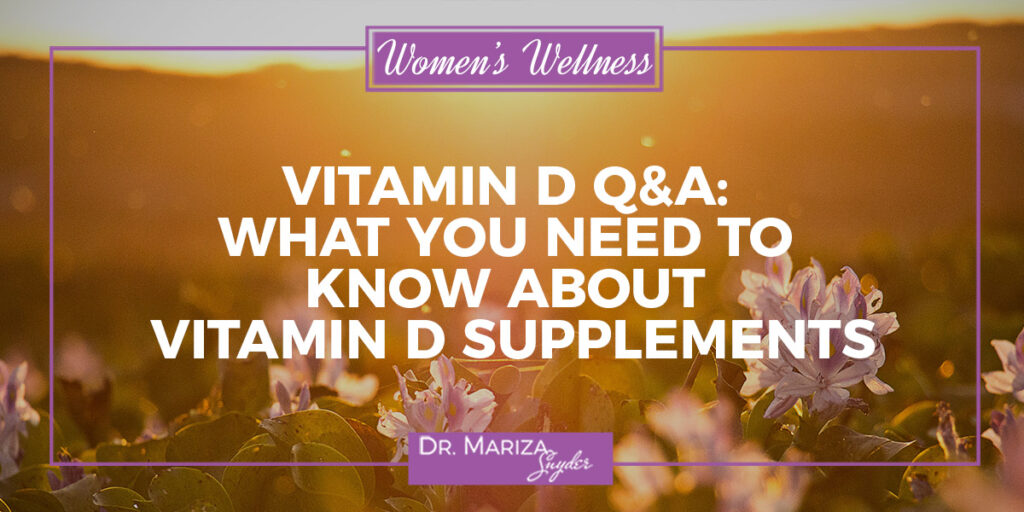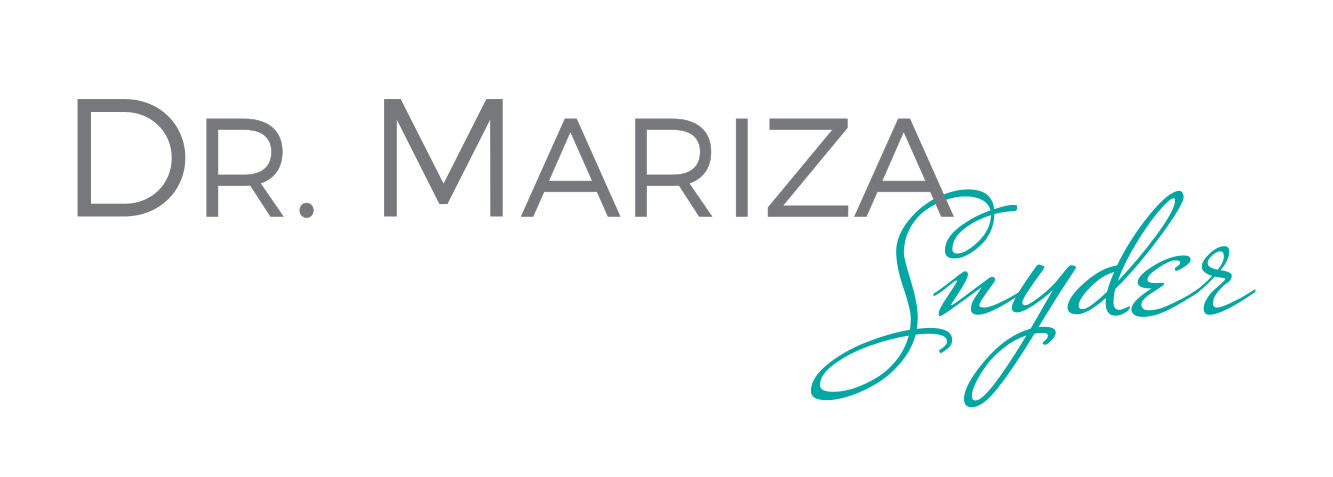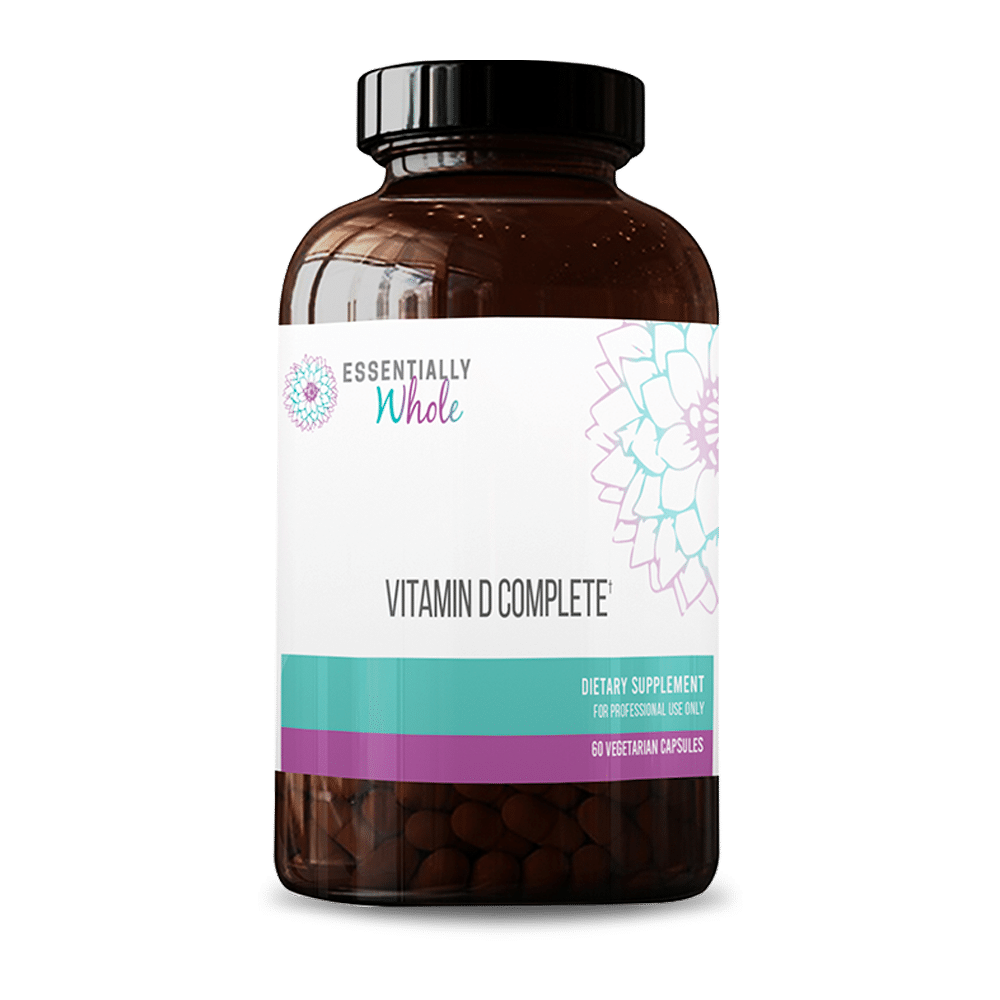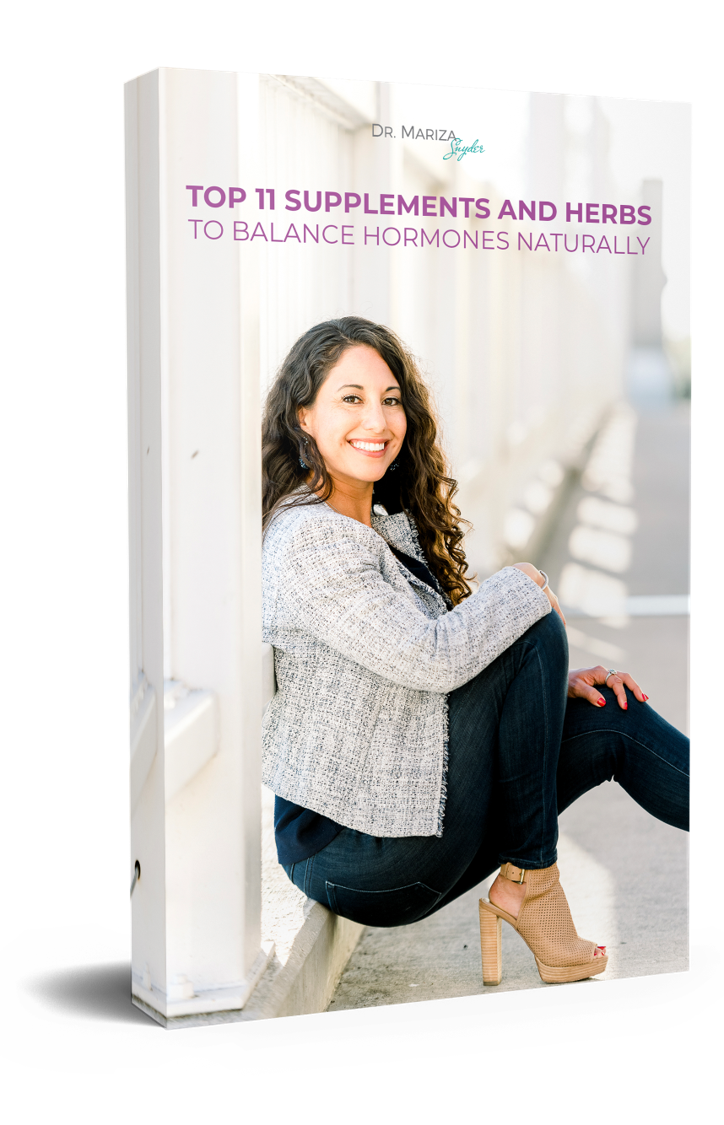
Every single cell in your body has receptors for vitamin D, and each system relies on it to function at its best. This critical nutrient impacts immunity, bone health, heart health, hormone function, energy, mood, sleep, and so much more.
Studies consistently show that a majority of us (up to 80%) aren’t getting as much as we need, which is why supplements are SO critical for safely and quickly upping your vitamin D levels!
Vitamin D Complete is continuously one of my best-selling supplements in the Essentially Whole® store, but there are still lots of questions about when (or if) it’s necessary and how to get the most bang out of your supplements!
Here are some of the top Vitamin D Supplement Questions I get on a regular basis:
How do I know if I need to take vitamin D?
Everyone can benefit from it. It’s virtually impossible to have too much of this vitamin in your system, so supplementing is only going to help and not hurt!
That being said, deficiencies are a super common occurrence, especially in women.
7 signs of a deficiency include:
- Getting sick often
- Trouble sleeping
- Feeling tired all the time (even if you do sleep pretty well)
- Having a deep ache in your bones, especially in your back
- Dealing with depression, anxiety, or mood swings regularly
- Sore muscles (especially if it takes you a long time to recover)
- Losing hair
If you identify with any of these, you’ll want to start at a higher dose (see below for dosage recommendations), but as I said—if you’re reading this, you need to be taking a quality vitamin D supplement!
Check out this article for 10 additional benefits for your health you can expect from upping your vitamin D intake. >>
Can’t I get enough vitamin D from being in the sun?
It’s true that the sun activates this vitamin in your skin into its active form that your body can use. However, most of us just can’t do it all from being in the sun.
Unless you live right on the equator, have beautiful clear sunny skies every single day (in every season), and aren’t wearing sunscreen (or lots of clothing), the sun won’t give you all you need to maintain optimal levels.
If you do live in a sunny environment and spend lots of time outside during particular seasons, you may be able to reduce your supplement dosage during that season if you feel like you’re getting enough. But if you’re exposed to sickness or are going through a rainy or cloudy season, you’ll want to up it again to make sure you get what you need.
And even then, high levels of sun exposure don’t guarantee good vitamin D levels. There have been studies of people in Hawaii who spend several hours outdoors every day who still have suboptimal D levels. (1)
So in conclusion, spend time in the sun!
Get the natural boost and circadian-regulating effects of daily sunlight. But don’t rely on it as your only source.
How much vitamin D do you recommend per day?
I recommend a dosage of 5,000-10,000 IU each day (1-2 capsules of Vitamin D Complete). In most people, this tends to be the sweet spot for increasing your levels long-term as well as supplying what your body needs at the moment.
If you are looking for some extra immune support and are concerned about being exposed to something, it’s a good idea to step up your dosage to 10,000 IU (2 capsules) twice per day for 2-3 days. Your body burns through it much faster when it’s stressed or fighting off sickness, so adding an extra dose on those days is always going to be helpful!
When should I take vitamin D?
You can take it with any meal. Ideally, you would take your vitamin D along with a source of fat. This is helpful because this is a fat-soluble vitamin, so it’s better absorbed when there is also fat present.
Why is vitamin D so important as we get older?
Protecting your bone health is critical as you age to protect your youthfulness and strength for decades to come. Vitamin D helps by absorbing calcium from the foods you eat so your body doesn’t turn to leach this mineral from your bones instead.
A deficiency is directly related to bone diseases like osteoporosis, so along with its other benefits, this is an important reason for women over 40 to increase their intake!
Why is vitamin D3 better?
Most supplements come in one of two forms:
- D2 (also known as ergocalciferol) is the synthetic version that is harder for your body to use.
- D3 (also known as cholecalciferol) is the form that is easier to absorb into your body and acts like the kind your body makes naturally.
Studies also show that, while both D2 and D3 increase your body’s vitamin D levels in a similar way short-term, D3 results in better sustained levels of vitamin D in your body (while vitamin D2 drops off significantly after a very short time).
I chose to create Vitamin D Complete with D3 (along with cofactor vitamins K1 and K2—see next question) because it’s going to be the most effective for your body long-term. It addresses the underlying deficiency and prevents it from happening when you take it regularly!
What co-nutrients do you need to take with vitamin D?
Vitamins K1 and K2 are critical parts of getting vitamin D to actually work in your body. No nutrient works in isolation; everything requires a delicate balance. This is why taking a D3 supplement without K1 and K2 isn’t going to be as effective.
These vitamins will help you get the full benefit of your supplements, with nothing wasted because your body wasn’t able to use them.
Save 15% on the Highest Quality, Proven D3 Supplement Today!
My Vitamin D Complete has all of the above and more – and is the most absorbed, potent, and quality version you can find.
Here’s what women are saying about Vitamin D Complete:
Here’s what women are saying about Vitamin D Complete:
“Being deficient in Vitamin D, I’m glad to have found a high-quality supplement that combines Vitamins D & K for maximum absorption and impact. And the price is very reasonable for the dosing and quality.” – Carla
“I absolutely love the Vitamin D supplements. I had my blood work done prior to getting these and I was very deficient. My energy was low and I couldn’t remember the last time I had a solid nights sleep. Within 2 months of taking these along with the balancing hormone supplements, my blood work is back to normal levels and my sleeping is a lot more consistent. I would highly recommend these supplements to anyone who is struggling with menopause.” – Susan
You don’t have to just “push through” and suffer through symptoms caused by your nutrient deficiencies.
A simple change like adding supplements to your daily routine can really create a breakthrough where you feel better, have more energy, and experience relief from your most disruptive symptoms!
Get Your Vitamin D Here! >>>Reference:
1. https://pubmed.ncbi.nlm.nih.gov/17426097/



No comments yet.